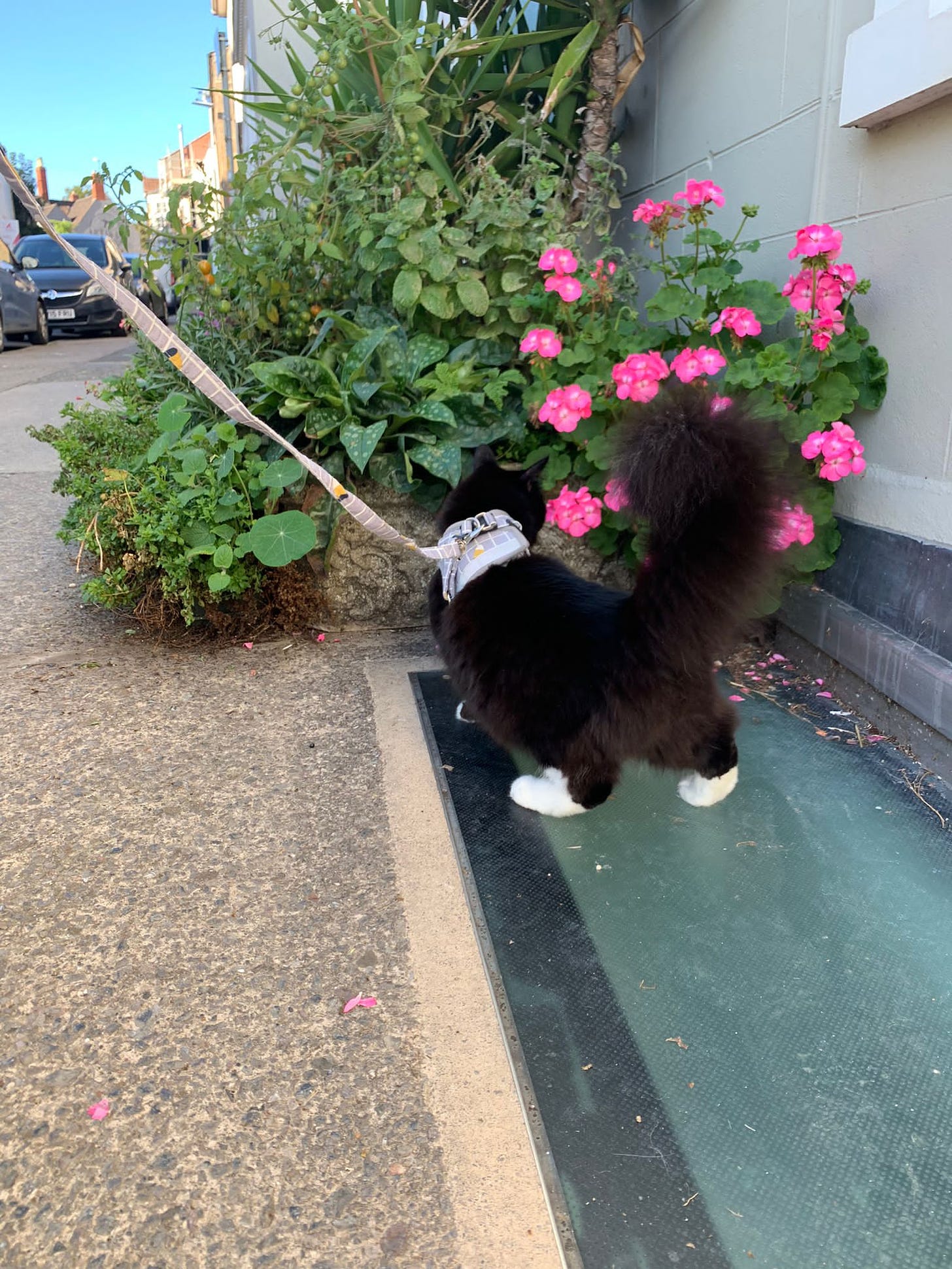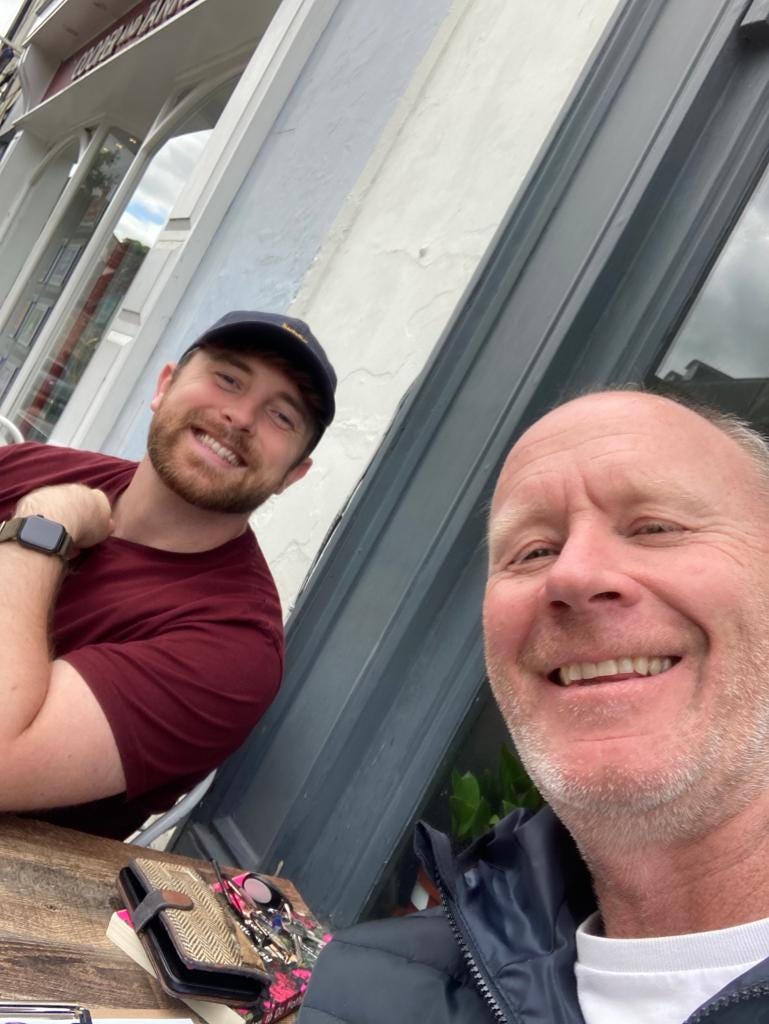tl;dr: neurodivergence, walking the cat, and heavy love.
Please support my writing: subscribe to this letter, buy me a coffee, maybe a book, or let’s work together. Thank you!
Hello,
Here are ten things from the past week I’d like to remember.
one
(& I made some time to actually fill it in this week.)
two
On Friday, I was diagnosed with severe combined ADHD.
Roughly 15% of people are what’s known as neurodivergent — their / our brains receive & process & respond to information in uncanny ways within the neurotypical world, for better & worse. We’re likely to develop better self-awareness & -soothing methods, as well as resilience, but often preceded by greater struggles with depression & anxiety; we collapse without routine & demand clear expectations & explanations, ironically things we’re rubbish at doing ourselves; we’re impulsive in what we say & do, obsessive, prone to accidents; we’re more creative, innovative, and attention deficit (the ‘AD’ part) isn’t entirely accurate — we hyperfocus, it’s just a lot of the time (without regulation) it’ll be on the wrong things.
We’re either mega fully engaged or didn’t hear a word you just said directly to our open, nodding face.
‘When you haven’t found something to focus on, you’re like a rabbit caught in the headlights of a fast-approaching truck.’
This metaphor, handed to me aged fifteen by my first therapist, stuck. Too much or too little to do? You’ll freeze. Fifteen years of intense ‘doing’ (fifteen homes, as many jobs) and ’not doing’ (long periods of anxiety & depressed wall-staring episodes) have passed — now I have some explanation for it. It was never about finding the sick note, you see, or an excuse for the ways I think & am, but finally understanding, rather than chastising, myself.
Now, maybe, finally, I can work with the brain I have.
three
World War Z by Max Brooks (2012) comments on how the enemies we don’t fully understand (here: zombies, but it could work for, say, coronavirus, too) are often humanised to make them less ‘other’ — more recognisable and, therefore, beatable. When we look to actively hate certain groups of people, though, we ‘other’ them by removing their status as humans — right-wing parties will dehumanise refugees, for example, by comparing them to plagues or non-human animals.
Humanity is what we’re most familiar with; the scale of how close to human we describe them as determines whether we want to know them better.
four
Reading Wilkie Collins’ The Woman in White (1860), I caught myself drifting & rushing through long descriptions of the protaganist’s newfound love. I’d expected, wanted, narrative, not pages of gushing. But: if the story was given, as I wanted, without that texture of people, without some rambling & thought processes of the people involved in said story, if I had no texture of those people — their faces, mannerisms, histories — would what happened to them truly stick?
(Also: When looking for the novel’s publication date, I hadn’t realised it was originally published in serial form, bit-by-bit from late 1859 through to 1860 in both Charles Dickens' magazine All the Year Round (UK) and Harper's Weekly (US). It was a book by 1860. Platforms like Substack, then, have had great success before! I’m going to try and read the rest of the book a chapter each morning & evening, too, to semi-serialise it.)
five
my love has concrete feet
my love’s an iron ball
wrapped around your ankles
over the waterfall
Commenting on Heavy in Your Arms, a song she’d co-written for indie rock band Florence + the Machine and the soundtrack for The Twilight Saga: Eclipse (2010), lead singer Florence Welch said: ‘I suppose it’s about the weight of love, how sometimes it can be a burden between two people.’’ She saw a central theme in the film series: whether the love given to someone could either rescue or condemn them.
On a long, melancholic walk to the gym, the song gave words to some thoughts I’d had earlier in the day. Before my ADHD diagnosis, I’d asked my partner to fill out the parts reserved for someone who knew me well. It was insightful, seeing my self from the perspective of someone who knew me everyday. Admittedly, the questions don’t gear themselves towards positive feedback and none of it was negative — ‘it’s just feedback’, she said, and it was incredibly helpful to see how the perspective of those closest to you can vary so drastically from what you assume about yourself. I was, though, briefly concerned that my love was more burdensome than enabling; more condemnation than freeing.
(I checked: You’re not a burden — everyone has their ‘things’ — you’re just an occasional pain in the arse. It doesn’t make it any harder to love you.) Gross.
six
Mike Flanagan’s The Haunting of Hill House, my rewatch now complete, was consistently spectacular, moving, funny, and, of course, scary, despite my knowing what was coming. It’s made me want to build my film and / or criticism vocabulary to better talk about these things — I’ll be making a note to read more reviews of the things I love most in future.
Episode 6 was pure theatre. The first long take was 25 minutes long, with adult & childhood counterparts, some dead, others alive, swapping places throughout the long conversation as the camera swung wildly between different character perspectives in the room. That, the instability of lighting, blocked-then-visible views — it was all wonderfully disorientating and had such a profound effect on my attention.
I wondered: what does it do to tell a story in one go, one day. one full moment, without pausing between? Like, those incredibly long books in one sentence or a film with no cuts in camera. What’s the effect on the audience?
seven
One thing that’s always put my brain-brakes on is running.
My first parkrun yesterday — I’m on Strava — took a lot longer to complete than it used to but, finally, I finished one and made some little goals: walk a little less and work my way up to a full run. Similar to a long gym session, I soon felt relaxed — the urge to do and fidget had gone, the ability to focus elbowing itself some room.
The etymological root of exercise is in the Latin exercere — to keep busy, practice — from ex- (thoroughly) + arcere (keep in or away). To me, this reads as thoroughly maintaining some desired state. In my case, exhaustion — from Latin exhaurire (drain out) — seemed to melt away the extra energy I had, the excess — from Latin excedere (go out, surpass).
To maintain my desired state, I had to drain the build-up.
Exercise exhausts excess.
(I dunno, I just love etymology.)
eight
My cat, Boudica, who has lost 8/9 lives to date, got real brave today. Now an indoor cat, I was keen for her to experience the outdoors — the nonsense about them being ‘wild’ and better off outside is silly when you consider most of us live in urbanised, non-wild spaces, and our housecats are not feral, but I wanted her to feel comfortable with what’s outside.
She inched her way outside for a bit, sniffed about, ran terrified back indoors, but the lead made us both feel more secure with those next steps. It feels like a side-story to a bigger one: trying new things with a safety net & someone to keep an eye out for you.
nine
We wanted something easy to watch.
Eurovision Song Contest: The Story of Fire Saga was a bit of fun — you’ll find my rating on Letterboxd & MUBI — and the final song, though, Husavik, was moving in its references to recognising the worth of one’s hometown, particularly when related to its local biosphere: the seagulls & mountains & whales of Iceland, in this case.
The book I’m reading at the moment, How to Do Nothing by Laura Odell, talks through the process of disconnecting from the attention-sapping automatic behaviours of our world today, and paying closer attention to the ways we engage with the literal world around us: trees, road networks, rivers, plants, bugs, landscape. She considers it remarkably grounding, and as nature writing is an area I’d love to explore, Frome may become my testing ground.
ten
Things to schedule for the coming week.
Finish The Haunting of Bly Manor (Mike Finnigan, 2020), How to Do Nothing by Laura Odell, World War Z (narrated by multiple people) by Max Brooks (2012), and (ambitious, I know) The Woman in White.
30-minute writing sessions for this letter on Thursday & Friday, then Saturday, then 90 minutes on Sunday — total of three hours each week.
An hour to organise my culture log with the year I can remember.
Time to do nothing (or, whatever I want).
Create an areas of interest list so I don’t lose track of Qs above.
&
Thank you for reading! You can support my writing in a few ways — I’m grateful for any of them. Subscribe for free on the button below (or consider paying a few quid for it), leave a comment below, buy me a coffee, maybe a book, or work with me.




